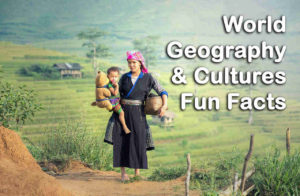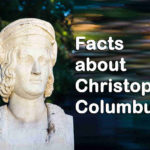World Geography and Cultures Fun Facts

1. In Japanese culture, the two main religions are Shintoism and Buddhism. Many people in Japan do not practice their religion anymore because it has become less of an important part of their life.
The main religions of Japan are Shinto and Buddhism. In Shinto, the physical world is thought to be a living entity, or kami. The spiritual encompassing this physical world is called kamisama. Kamisama was embodied by various gods and spirits including Amaterasu, the sun goddess; Susanoo, the storm god; and Uke Mochi, who could grant prosperity in farming. In Buddhism most people get their understanding of religion from Buddhism scriptures such as the Lotus Sutra or teachings from Buddhist scholars such as Dogen in Japan and Nichiren globally.
2. The Hawaiian alphabet has only 12 letters. This may seem daunting to those of us who are used to the 26 letters that make up the English alphabet, but with a little practice hoping to Hawaiian words becomes easier.
The Hawaiian alphabet contains 12 different sounds or letters. These include: A E H I K L M N O P U W ʻ (a small kahakō). Any letter not noted below has a value of either “A” or “O”. The sound for each letter is pronounced as follows: “A” as in father, “E” like the frisson near your ear, and so on.
3. The country of Samoa is actually 23 hours ahead of American Samoa! However, because of a quirk in the International Date Line, they’re only 43 miles apart.
Because American Samoa is only 31 miles from the 180 degree meridian, the line of longitude that runs through the Pacific Ocean due south of the equator, American Samoa lies to the east of the date line and Samoa lies to the west. This means that American Samoa observes their time in reference to UTC-11 while Samoa observes its time in reference to UTC+13 meaning they are 23 hours ahead.
4. New Zealand has a sheep to human ratio of approximately 6:1.
The first thing to know about New Zealand is that it has a lot of sheep. It’s estimated that there are somewhere between 25 and 30 million sheep in the country, which means there is about one sheep for every four people. And while this ratio might sound ridiculous at first, New Zealand does have one of the smallest human populations in the world.
5. In Croatia, there is a museum of broken relationships.
One of the more popular exhibits is the “Wall of Shame.” It has photos from social media postings where people announce their break-up or divorce. In Croatia, there is a museum of broken relationships.
The museum also has a section for all those marriages that have lasted at least 30 years. But those are hard to come by in this day and age, with so many divorces happening every year in America alone (about 50%).
The museum does not discourage ties being cut – quite the opposite in fact – and they are also on Instagram as “Broken Relationships Museum”.
6. The Pirahã tribe has 8 consonants and 3 vowels in its language.
The vowels are pronounced as follows: a, e, ɨ. The consonants are pronounced as follows p, k, t, s, m. The Pirahã language has been around for centuries and its origins can’t be found with enough certainty. It is speculated that the Pirahã tribe’s language has similarities to other Brazilian dialects which indicates that there may have been a mixture of Indian and Portuguese languages in Brazil at some point in time long ago.
The earliest evidence of the Pirahã tribe is about 200 years ago which is when Brazilian colonization by non-indigenous people started to occur in these parts of Brazil where the tribal lands exist today.
7. In Australia, banknotes are waterproof. This means that money from your pocket or purse will be safe and dry if you ever happen to get caught in the rain. It is hard to imagine how difficult it would be if this wasn’t the case.
Many of you have probably experienced getting wet cash at some point in your life. Those moments where an entire day’s worth of work can be rendered unusable because someone spilled a drink on your clothes or rained on you while you were outside walking home are all too common for most people. Imagine if, in addition to this hassle, you also had to worry about whether or not your cash was still usable. Would you always have to check each banknote as soon as it came out of your wallet or purse? Would any change that you received need to be counted by hand before being put into a bag? These are the sorts of things that wouldn’t be issues if cash in Australia was made waterproof.
The truth is that banknotes have been waterproof for almost 100 years now. On May 20th, 1928, a patent was filed by Sir James Horlick and Dr. John McKetta for the idea of money being water-resistant.
8. The longest river in the world is the Nile. It is a river in Africa. The Nile is around 4,160 miles long. It starts in the Great Lakes of Africa to where it ends in the Mediterranean Sea. The Nile only has one tributary which is the Blue Nile. The other tributaries are known as “saddles”.
People have lived near this river for over 5,000 years because it is one of the most dependable sources of water in North Africa along with being an important means of transportation for people living on either side of it.
9. In Taiwan, garbage trucks play music to remind people to bring out their trash. Sort of like an ice-cream truck but for getting rid of your trash!
Taiwan’s garbage trucks now play music in their honor! The Gongliao District Environmental Protection Bureau in New Taipei City has begun outfitting its fleet of garbage trucks with speakers that will blast local tunes when picking up trash, as a way to wake up the sleepy, grumpy neighbors.
The project was spearheaded by the district bureau and took three months for completion. “We hope to give residents a sense of comfort,” said Chou Feng-yu (周豐裕), director of the bureau. “The sound should be loud enough to stir them from their sleep.
10. When measured from the center of the earth, Ecuador’s Mount Chimborazo is higher than Everest in Nepal. Hawaii’s Mauna Kea is also taller than Everest when measured this way.
Mount Chimborazo, an inactive volcano located in the Andes on the border between Ecuador and Peru, is one of the tallest peaks in the world at nearly 6.2 miles (10 kilometers) high. It’s also a tropical mountain with lush vegetation and wildlife.
It’s not all sunshine and rainbows though; there are still dangers for visitors to face like landslides and avalanches — which make climbing this steep peak even more of a challenge. Mount Chimborazo is not only taller than Everest, it has also been measured as being four inches farther from Earth’s center than Everest because it sits on thicker crust rocks that have been pushed up towards Earth’s surface by continental plates moving around over time.
World Geography and Cultures Fun Facts Part 2
11. Spain, Bosnia and Herzegovina, Kosovo, and San Marino—have no words in their national anthems.
The national anthems of these countries all share a common pattern, as they are composed of several parts, which together represent the history and culture of their respective nation.
However, an anthem can be either humorous or sad (e.g. Russia’s anthem is humorous with lyrics such as “We’ll chase the enemies from off our land” and “We stand like a wall before our country”) or it can have patriotic lyrics with strong emotions thrown in (e.g. Canada’s anthem). National anthems also differ in how they are sung—from slow and solemn to proud and spirited—but all serve to stir up feelings of patriotism for their respective countries.
12. The Vatican City has the highest wine consumption rate in the world with 105 bottles per resident a year. This is more than any other country.
Vatican City has the highest wine consumption rate in the world. The Vatican’s wine production has doubled since 2013, going from 6 million liters to twelve million, and it is the world’s second largest buyer of wine after France.
With the growing interest in fine wines and high-value vineyards, many wineries are looking to specialize in making great wines for the Vatican. “It’s a very cultured market,” said Mario Schiavon of Italy’s Vinitaly trade fair.
Vatican City also got permission from Italy to produce their own branded wine label and sell it around the world. This new venture is expected to strengthen its economy by providing steady income year-round instead of relying solely on donations for economic support.
13. Only two ATMs are in Antarctica, both of which are NCR machines owned by Wells Fargo.
Only two ATMs are in Antarctica, both of which are NCR machines owned by Wells Fargo. That’s right, there are just two bank machines in the entire continent of Antarctica and they’re both run by Wells Fargo. The first was installed in 2008 at McMurdo Station, a U.S. research station located near the geographic South Pole, and can handle up to $400 an hour and dispense about 120 bills a minute.
The second ATM is located at the U.S. Antarctic Program’s headquarters near the South Pole and was installed in 2013, but it is not operational during winter when it’s dark 24 hours a day and too cold -50 degrees Fahrenheit to transport cash or make repairs (that’s not counting the altitude of 9,300 feet).
14. A new study has found that about one-third of seafood products in the United States are mislabelled. according to a study by Oceana. The average level of fraud is 36%, based on a sample of more than 1,200 fish samples collected from 11 U.S. states and tested for authenticity at UCLA’s Department of Environmental Health Sciences laboratory.
The most commonly misrepresented fish are snapper and tuna (both 42% incidence), followed by cod (38%), salmon (28%) and halibut (25%).
15. Starting in 2020, France has banned three single-use plastics: cotton ear buds, plates, and cups. In 2021, the country will ban plastic cutlery and straws for the same reason.
French Minister for Ecological and Inclusive Transition François de Rugy has said, “The goal is to fight the pollution of the oceans and to promote a way of life which does not include throwing everything away. We do not want people in France to get used to living with polluting products.”
This is a big step for France, but it’s part of a much larger trend. As awareness of climate change grows, so do efforts against single-use plastics. After all, they don’t break down inside nature’s system—they just break down in our own.
16. The climate in Quito, Ecuador is considered to be the world’s most pleasant, earning it the nickname “The Land of Eternal Spring.”
Foreign travellers are often surprised by the abundance of green space, blooming flowers, and fresh air in Quito.
Rainfall is scarce during the year, averaging only 17-22 inches annually. Nevertheless, since most rain falls between December and March, this season is considered to be a high tourist season. Temperatures are mild year-round with an average high of 79°F (26°C) during the hottest months and an average low of 55°F (13°C) in January or February which includes very low humidity making it pleasant for tourists who suffer from hot weather elsewhere.
17. Maryland’s official state sport is jousting. It was the very first state in the US to adopt one.
Jousting is a form of mounted combat in which two knights charge at each other on horses, holding a lance or spear either in their hands or under their arm, with the intention of striking the opponent. It is believed to have originated with cavalry combat. In historical jousting tournaments, knights would often compete one-on-one in timed challenges and for sport; they may also fight side by side against team competitors.
18. The last nation to outlaw slavery was Mauritania, which did so in 1981.
Mauritania is a small country, in northwest Africa, and its total population is 3.86 million. It’s bigger than many of the other African countries, but much smaller than the United States. With a landmass larger than Texas and California combined.
A more interesting fact about Mauritania is that it was the country with the last recorded slave for sale in 2007. The slave was priced at $90,000 and was to be purchased by an Arab from Saudi Arabia.
A more modern and disturbing fact that is part of the story of slavery in Mauritania is the number of people who still live in slave-type conditions. The CIA Factbook estimates that as many as 20 percent of Mauritanian society still lead a slave-type existence.
In many ways, Mauritania, despite being independent from European colonization since 1960, still adheres to its ancient traditional mores. In this case it has not been able to successfully modernize its views against slavery. This especially includes the treatment of sub-Saharan slaves who are an estimated 600,000 in number today.
19. A staple diet of rice is eaten by almost half of the world’s population. This blog post will cover the benefits and how to prepare a good porridge.
The benefits of rice include: a high-quality carbohydrate source, abundant in vitamins and minerals; energy-rich food, for populations with low access to meat, fish or other animal proteins; relatively inexpensive food source. Rice porridge can be made from any type of rice but brown rice is best as it has more fibre. For those who are vegetarian or vegan, you can also make your porridge from oatmeal if you prefer that over dairy milk (though it doesn’t have vitamin B12 so will need supplements).
20. In the US, restaurant sales of meat alternatives increased by over 260% in 2019
The United States is home to about one-third of all vegan restaurants worldwide. Approximately 6% of Americans identify as vegetarian or vegan while 54% consume dairy products and 70% eat eggs at least once a week. According to data analysis conducted by the Plant Based Foods Association (PBFA) and Nielsen, sales of plant-based meat alternatives increased by about 10% from 2018 to 2019. The Association reported that during that same time period, sales of meat alternatives increased by over 260%.
Read more Facts and Knowledge

